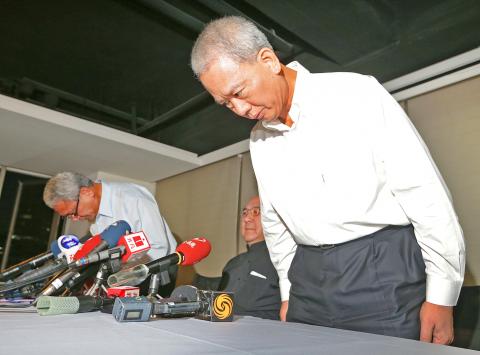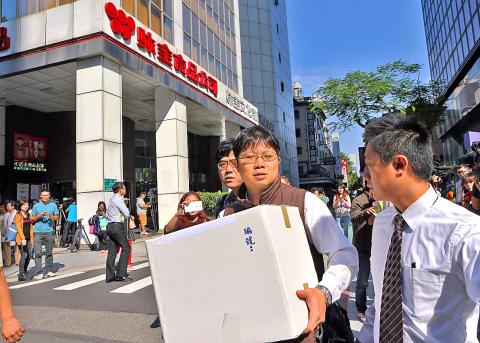Ting Hsin International Group (頂新國際集團) yesterday said it would withdraw from the oil-manufacturing market and donate NT$3 billion (US$98.65 million) to the government to atone for the food safety scandal.
The group made the announcement following days of turmoil caused by its subsidiary Cheng I Food Co Ltd (正義) after it added oils meant for animal feed to its cooking oil products.
“Under the current sentiment to boycott Ting Hsin, no matter what we do we understand it would not be enough to regain the trust of the public,” Wei Ying-chiao (魏應交) — chairman of Ting Hsin International Group — told a press conference in Taipei.

Photo: CNA
He said the group had decided to close its oil-manufacturing businesses in Taiwan and take full responsibility for the latest cooking oil scandal, pledging to fully refund and compensate consumers for any damage caused.
The Wei family has invited Taiwanese tycoon Samuel Yin (尹衍樑) to lead a new food safety committee set up by the group, hoping that Yin and other professionals can objectively evaluate the nation’s food safety loopholes as a way to revive public confidence in Ting Hsin, Wei Ying-chiao said.
“After the establishment of the committee, Ting Hsin will have more time to deal with its own management problems,” Yin told the press conference, without elaborating.

Photo: CNA
Yin is chairman of Ruentex Group (潤泰集團), the operator of RT-Mart (大潤發) hypermarkets in Taiwan and China. His business interests range from textiles, construction and retail sales to life insurance.
Wei Ying-chun (魏應充), former chairman of Cheng I, Ting Hsin Oil and Fat Industrial Co (頂新製油實業) and Wei Chuan Foods Corp (味全食品工業), was also present at the press conference, but he did not say a word.
After the press conference, Wei Ying-chun was taken to the Changhua District Prosecutors’ Office for questioning.
Prosecutors have listed Wei Ying-chun as a suspect in the scandal.
Wei Ying-chun arrived at the office in Changhua at about 8:40pm last night and was taken through a back door by officials.
Earlier yesterday, authorities conducted searches at Ting Hsin’s headquarters in Taipei 101, at the company’s product testing facilities and properties owned by the Wei family.
Coordinated by the Taiwan High Prosecutors’ Office, officials from local district prosecutors’ offices searched the offices of Wei Chuan Foods Corp (味全食品) in Taipei, the company’s food research center in Hsichih District (汐止), New Taipei City, the company’s food product analysis and testing center and Wei’s residence in the luxury condo complex The Palace (帝寶) in Taipei.
Prosecutors took away several cartons of evidence. Among the documents seized were the accounts of Wei Chuan Foods, along with sales orders and purchase receipts, officials said.
During the search at Wei Chuan Foods, Changhua prosecutors briefly questioned a number of high-level executives to clarify details related to the food scandal.

FOUR DESIGNATED AREAS: Notices were issued for live-fire exercises in waters south and northwest of Penghu, northeast of Keelung and west of Kaohsiung, they said The military is planning three major annual exercises across the army, navy and air force this month, with the navy’s “Hai Chiang” (海強, “Sea Strong”) drills running from today through Friday, the Ministry of National Defense said yesterday. The Hai Chiang exercise, which is to take place in waters surrounding Taiwan, would feature P-3C Orion maritime patrol aircraft and S-70C anti-submarine helicopters, the ministry said, adding that the drills aim to bolster the nation’s offshore defensive capabilities. China has intensified military and psychological pressure against Taiwan, repeatedly sending warplanes and vessels into areas near the nation’s air defense identification zone and across

FORCED LABOR: A US court listed three Taiwanese and nine firms based in Taiwan in its indictment, with eight of the companies registered at the same address Nine companies registered in Taiwan, as well as three Taiwanese, on Tuesday were named by the US Department of the Treasury’s Office of Foreign Assets Control (OFAC) as Specially Designated Nationals (SDNs) as a result of a US federal court indictment. The indictment unsealed at the federal court in Brooklyn, New York, said that Chen Zhi (陳志), a dual Cambodian-British national, is being indicted for fraud conspiracy, money laundering and overseeing Prince Holding Group’s forced-labor scam camps in Cambodia. At its peak, the company allegedly made US$30 million per day, court documents showed. The US government has seized Chen’s noncustodial wallet, which contains

SUPPLY CHAIN: Taiwan’s advantages in the drone industry include rapid production capacity that is independent of Chinese-made parts, the economic ministry said The Executive Yuan yesterday approved plans to invest NT$44.2 billion (US$1.44 billion) into domestic production of uncrewed aerial vehicles over the next six years, bringing Taiwan’s output value to more than NT$40 billion by 2030 and making the nation Asia’s democratic hub for the drone supply chain. The proposed budget has NT$33.8 billion in new allocations and NT$10.43 billion in existing funds, the Ministry of Economic Affairs said. Under the new development program, the public sector would purchase nearly 100,000 drones, of which 50,898 would be for civil and government use, while 48,750 would be for national defense, it said. The Ministry of

SENATE RECOMMENDATION: The National Defense Authorization Act encourages the US secretary of defense to invite Taiwan’s navy to participate in the exercises in Hawaii The US Senate on Thursday last week passed the National Defense Authorization Act (NDAA) for Fiscal Year 2026, which strongly encourages the US secretary of defense to invite Taiwan’s naval forces to participate in the Rim of the Pacific (RIMPAC) exercise, as well as allocating military aid of US$1 billion for Taiwan. The bill, which authorizes appropriations for the military activities of the US Department of Defense, military construction and other purposes, passed with 77 votes in support and 20 against. While the NDAA authorizes about US$925 billion of defense spending, the Central News Agency yesterday reported that an aide of US